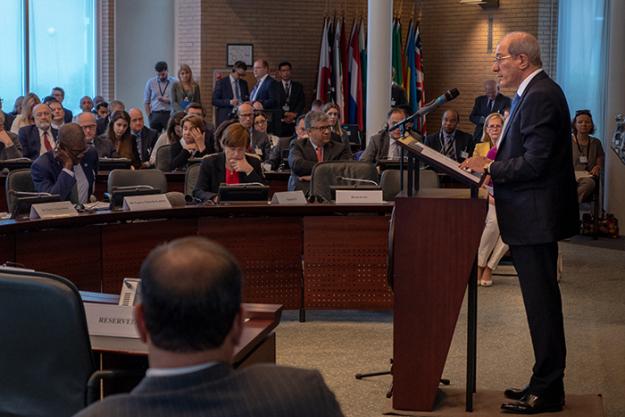
OPCW Director-General, Ambassador Ahmet Üzümcü, opening the conference
THE HAGUE, Netherlands — 7 June 2018 — Over 200 governmental experts, academics and industry representatives have gathered today for a two-day Conference on Countering Chemical Terrorism, convened by the Organisation for the Prohibition of Chemical Weapons (OPCW) at its headquarters in The Hague.
The conference will examine the threat posed to international security and to the Chemical Weapons Convention by chemical terrorism, and consider approaches to preventing and responding to the terrorist use of chemical weapons.
Opening the conference, the OPCW Director-General, Ambassador Ahmet Üzümcü, called for increased cooperation and enhancement of international efforts to counter chemical terrorism. “Countering chemical terrorism is a formidable task. We do not expect to do this alone. All present attendees, and many others, have a part to play. I hope that this conference will bring new perspectives and open up new avenues for further cooperation and concerted action,” he said.
The Executive Director of EUROPOL, Ms Catherine De Bolle, delivered the conference’s keynote address, where she underscored the crucial role of international law enforcement cooperation in preventing terrorism and in bringing perpetrators of terrorist attacks to justice.
The conference event features sessions focusing on the risk and threat of chemical terrorism, prevention, response, national experiences, and the legal accountability of non-State actors. Its proceedings will be included in a report to be published on the OPCW website.
Background
States Parties to the Chemical Weapons Convention have discussed the Convention’s contribution to global counter-terrorism efforts since 2001.
In October 2017, the OPCW Executive Council adopted a landmark decision on addressing the threat posed by the use of chemical weapons by non-State actors. The OPCW also co-chairs the UN Counter-Terrorism Task Force’s Working Group on Preventing and Responding to WMD Terrorist Attacks.
As the implementing body for the Chemical Weapons Convention, the OPCW oversees the global endeavour to permanently and verifiably eliminate chemical weapons. Since the Convention’s entry into force in 1997 – and with its 192 States Parties – it is the most successful disarmament treaty eliminating an entire class of weapons of mass destruction.
Over ninety-six per cent of all chemical weapon stockpiles declared by possessor States have been destroyed under OPCW verification. For its extensive efforts in eliminating chemical weapons, the OPCW received the 2013 Nobel Peace Prize.
More Information
- Opening address by the Director-General of the OPCW Ambassador Ahmet Üzümcü Conference on Countering Chemical Terrorism 7 June 2018 The Hague, the Netherlands
- Keynote Address: OPCW Conference on Countering Chemical Terrorism The Hague, 7 June 2018 Executive Director Europol Ms Catherine De Bolle
- Eighty-Sixth Session of OPCW Executive Council Acts on Non-State Actors
- Note by the Director-General: Status of the OPCW’s Contribution to Global Anti-Terrorism Efforts
- United Nations Counter-Terrorism Implementation Task Force
- OPCW Fact Sheets
